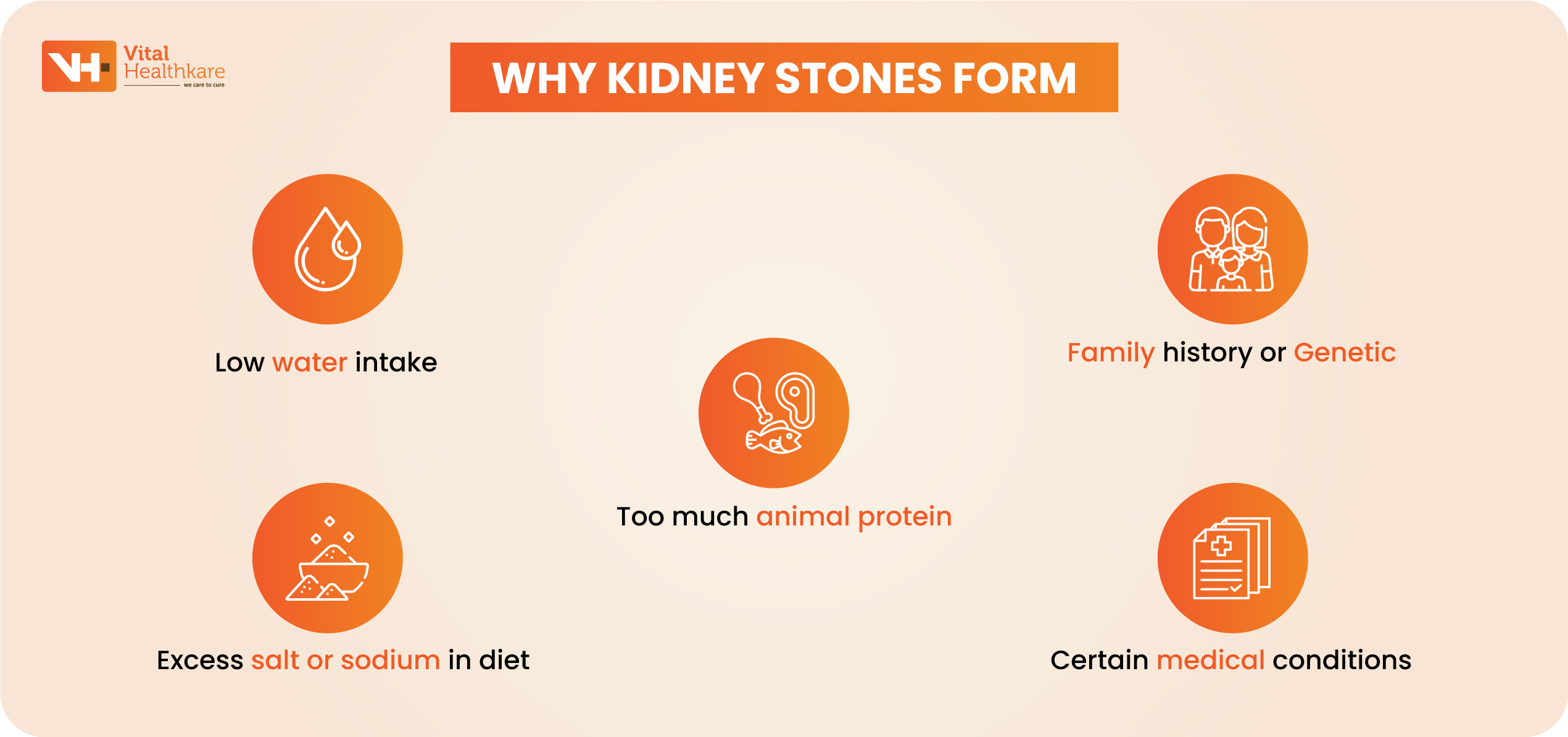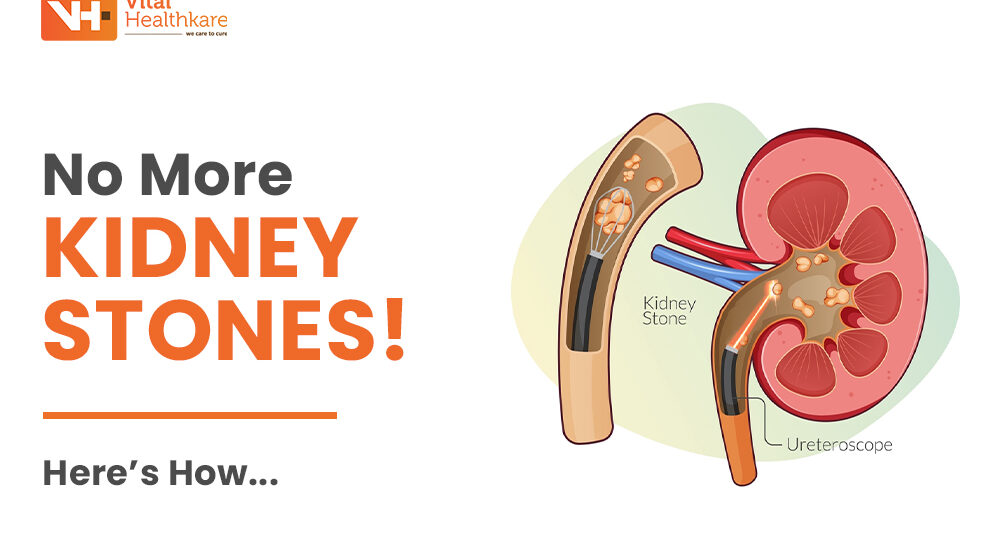Kidney stones are becoming increasingly common, especially in urban areas where lifestyle, diet, and dehydration play a huge role. If you’ve ever had one, you know how painful the experience can be — many patients describe it as more intense than labor pain! The good news is that with the right habits, you can reduce your risk significantly.
If you’ve ever wondered how to prevent kidney stones, this blog will guide you through the causes, risk factors, and most importantly, practical steps you can take in your everyday life to keep your kidneys healthy.
Understanding Kidney Stones
Kidney stones are hard deposits made of minerals and salts that form inside the kidneys. They can vary in size — from as small as a grain of sand to as large as a golf ball. While some pass naturally, others may require medical or surgical treatment.
Common Types of Kidney Stones
Calcium Stones – The most common type, usually caused by excess calcium oxalate.
Uric Acid Stones – More common in men, often linked to high-protein diets.
Struvite Stones – Often caused by urinary tract infections (UTIs).
Cystine Stones – Rare, usually due to genetic disorders.
Why Kidney Stones Form
Before we look at how to prevent kidney stones, it’s important to know the triggers. The main reasons include:
Low water intake (dehydration concentrates urine, making stones more likely).
Excess salt or sodium in diet.
Too much animal protein (meat, eggs, seafood).
Family history or genetic factors.
Certain medical conditions like obesity, diabetes, and UTIs.

How to Prevent Kidney Stones: Lifestyle & Diet Tips
1. Stay Hydrated – Water is Your Best Friend
The simplest and most effective prevention method is to drink plenty of water. When urine is diluted, minerals are less likely to crystallize into stones.
Aim for 8–10 glasses of water daily.
If you exercise heavily or live in a hot climate, increase your intake.
A good sign: Your urine should be pale yellow or clear, not dark.
2. Cut Down on Salt
A high-sodium diet increases calcium in your urine, which can lead to kidney stones. Avoid:
Processed foods (chips, packaged snacks).
Restaurant meals high in hidden salt.
Pickles, papads, and salty condiments.
Instead, flavor your meals with natural herbs, lemon, or spices.
3. Balance Your Calcium Intake
Many people think avoiding calcium prevents stones, but the opposite is true. Too little calcium actually increases oxalate absorption, raising your risk.
Include calcium-rich foods like low-fat milk, yogurt, or paneer.
Avoid overusing calcium supplements unless prescribed by your doctor.
4. Limit Oxalate-Rich Foods
Some foods are high in oxalate, which can bind with calcium and form stones. You don’t need to cut them out completely but consume in moderation.
High-oxalate foods include:
Spinach
Beetroot
Nuts (especially almonds, peanuts)
Chocolate
Tea
Tip: Pair these foods with calcium sources (like spinach with yogurt), so oxalate binds in the stomach and not in the kidneys.
5. Go Easy on Animal Protein
High-protein diets (keto, paleo, or too much non-veg) can increase uric acid levels and lower citrate — a chemical that helps prevent stones.
Reduce red meat, shellfish, and organ meats.
Try more plant-based proteins like lentils, beans, and tofu.
6. Maintain a Healthy Weight
Obesity and metabolic issues can increase the risk of kidney stones. Regular exercise and a balanced diet not only improve overall health but also protect your kidneys.
Aim for 30 minutes of activity most days.
Focus on gradual weight loss, not crash diets.
7. Watch Out for Sugary Drinks
Sodas, packaged juices, and energy drinks are linked to a higher risk of stones because of added sugars and phosphates. Instead:
Choose water, coconut water, or lemon water.
Fresh homemade juices (without added sugar) are fine in moderation.
8. Citrate-Rich Foods Can Help
Citrate is a natural chemical that prevents stone formation. Adding these foods to your diet can lower risk:
Lemons
Oranges
Grapefruits
Sweet lime (mosambi)
Try starting your day with a glass of warm lemon water — it’s a simple way to boost kidney health.
When to See a Doctor
Even with all precautions, stones can sometimes form. Seek medical advice if you experience:
Severe lower back or side pain.
Blood in urine.
Painful urination.
Frequent urinary tract infections.
Doctors may recommend medications, dietary changes, or in some cases, minimally invasive procedures like laser kidney stone removal (RIRS).
Key Takeaway
The answer to how to prevent kidney stones lies in hydration, balanced diet, and smart lifestyle choices. Small, consistent changes — like drinking enough water, cutting back on salt, and eating the right foods — go a long way in keeping your kidneys healthy.
At Vital Healthkare, we regularly counsel patients on kidney stone prevention and provide advanced treatment when needed. If you’ve had kidney stones before or have a family history, taking preventive steps today can save you from painful episodes tomorrow.
Frequently Asked Questions (FAQs)
Can drinking lemon water help prevent kidney stones?
How much water should I drink daily to prevent kidney stones?
Can I still eat calcium-rich foods if I have a history of kidney stones?
From BLog
News & Articles
Explore our latest news and in-depth articles featuring expert opinions, trending topics, and valuable insights to keep you informed and inspired.





